NURSING ASSIGNMENT 1: Health Assessment and Elderly Care Promotion
VerifiedAdded on 2021/05/31
|7
|1575
|22
Essay
AI Summary
This nursing assignment explores the crucial topic of promoting healthy ageing, particularly within the context of an increasing elderly population. The essay details a practical approach to health assessment by conducting a short interview with a hypothetical 60-year-old patient, Mrs. Jones, who has dementia and resides in a residential aged care setting. The student utilized the Levett-Jones Clinical Reasoning Cycle (steps 1-3 and 8) to structure the interview process, emphasizing the importance of creating a positive and comfortable environment for the patient. The assignment highlights the use of rapport-building skills, active listening, and non-verbal cues to gather information about the patient's physical health, psychosocial issues, and lifestyle factors. The student identifies barriers to healthy ageing, such as poor mobility, lack of family support, and cognitive impairments, while also reflecting on the challenges encountered and strategies for improvement. The essay underscores the significance of effective communication and interview skills in nursing practice to facilitate health promotion and improve the quality of life for older adults.
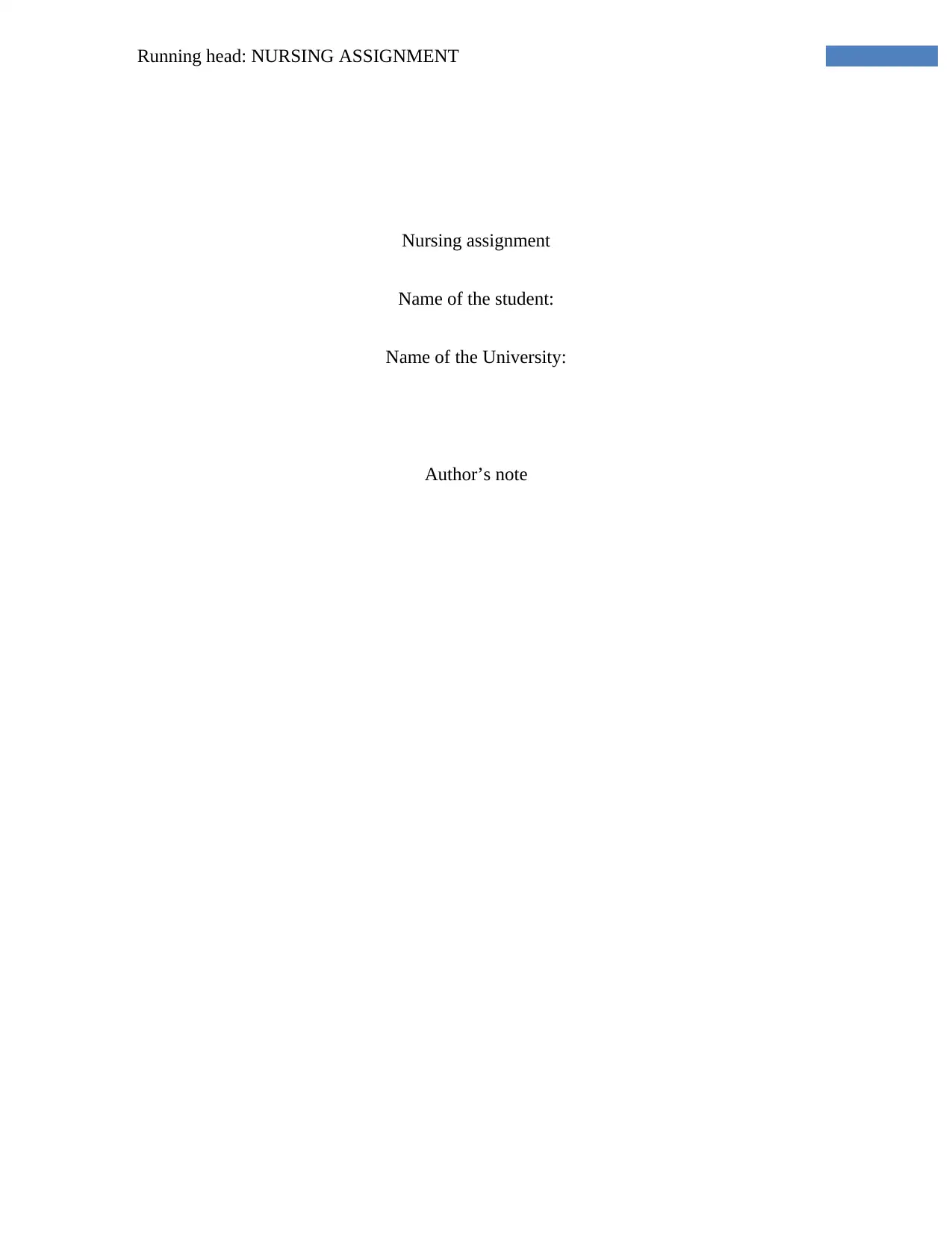
Running head: NURSING ASSIGNMENT
Nursing assignment
Name of the student:
Name of the University:
Author’s note
Nursing assignment
Name of the student:
Name of the University:
Author’s note
Paraphrase This Document
Need a fresh take? Get an instant paraphrase of this document with our AI Paraphraser
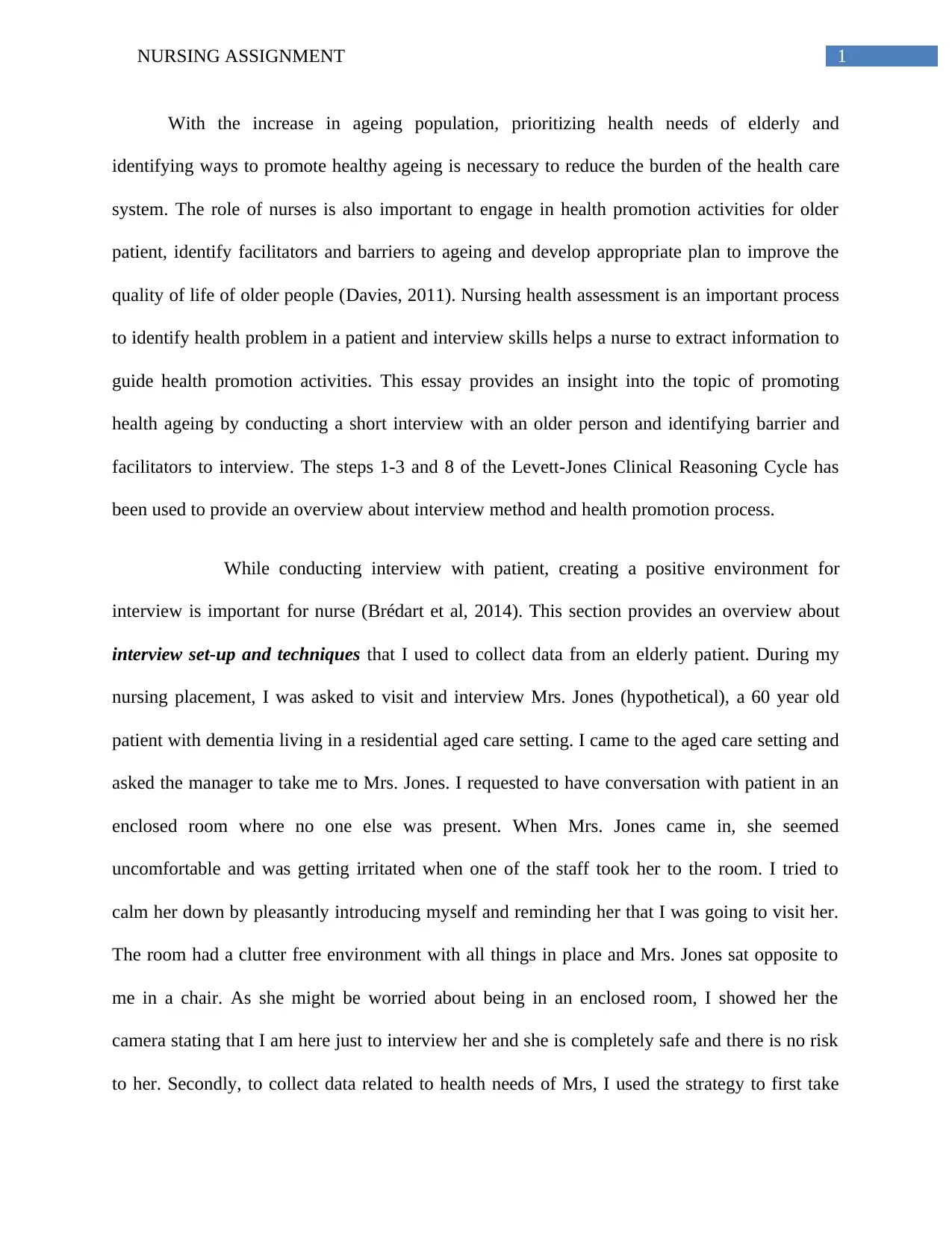
1NURSING ASSIGNMENT
With the increase in ageing population, prioritizing health needs of elderly and
identifying ways to promote healthy ageing is necessary to reduce the burden of the health care
system. The role of nurses is also important to engage in health promotion activities for older
patient, identify facilitators and barriers to ageing and develop appropriate plan to improve the
quality of life of older people (Davies, 2011). Nursing health assessment is an important process
to identify health problem in a patient and interview skills helps a nurse to extract information to
guide health promotion activities. This essay provides an insight into the topic of promoting
health ageing by conducting a short interview with an older person and identifying barrier and
facilitators to interview. The steps 1-3 and 8 of the Levett-Jones Clinical Reasoning Cycle has
been used to provide an overview about interview method and health promotion process.
While conducting interview with patient, creating a positive environment for
interview is important for nurse (Brédart et al, 2014). This section provides an overview about
interview set-up and techniques that I used to collect data from an elderly patient. During my
nursing placement, I was asked to visit and interview Mrs. Jones (hypothetical), a 60 year old
patient with dementia living in a residential aged care setting. I came to the aged care setting and
asked the manager to take me to Mrs. Jones. I requested to have conversation with patient in an
enclosed room where no one else was present. When Mrs. Jones came in, she seemed
uncomfortable and was getting irritated when one of the staff took her to the room. I tried to
calm her down by pleasantly introducing myself and reminding her that I was going to visit her.
The room had a clutter free environment with all things in place and Mrs. Jones sat opposite to
me in a chair. As she might be worried about being in an enclosed room, I showed her the
camera stating that I am here just to interview her and she is completely safe and there is no risk
to her. Secondly, to collect data related to health needs of Mrs, I used the strategy to first take
With the increase in ageing population, prioritizing health needs of elderly and
identifying ways to promote healthy ageing is necessary to reduce the burden of the health care
system. The role of nurses is also important to engage in health promotion activities for older
patient, identify facilitators and barriers to ageing and develop appropriate plan to improve the
quality of life of older people (Davies, 2011). Nursing health assessment is an important process
to identify health problem in a patient and interview skills helps a nurse to extract information to
guide health promotion activities. This essay provides an insight into the topic of promoting
health ageing by conducting a short interview with an older person and identifying barrier and
facilitators to interview. The steps 1-3 and 8 of the Levett-Jones Clinical Reasoning Cycle has
been used to provide an overview about interview method and health promotion process.
While conducting interview with patient, creating a positive environment for
interview is important for nurse (Brédart et al, 2014). This section provides an overview about
interview set-up and techniques that I used to collect data from an elderly patient. During my
nursing placement, I was asked to visit and interview Mrs. Jones (hypothetical), a 60 year old
patient with dementia living in a residential aged care setting. I came to the aged care setting and
asked the manager to take me to Mrs. Jones. I requested to have conversation with patient in an
enclosed room where no one else was present. When Mrs. Jones came in, she seemed
uncomfortable and was getting irritated when one of the staff took her to the room. I tried to
calm her down by pleasantly introducing myself and reminding her that I was going to visit her.
The room had a clutter free environment with all things in place and Mrs. Jones sat opposite to
me in a chair. As she might be worried about being in an enclosed room, I showed her the
camera stating that I am here just to interview her and she is completely safe and there is no risk
to her. Secondly, to collect data related to health needs of Mrs, I used the strategy to first take
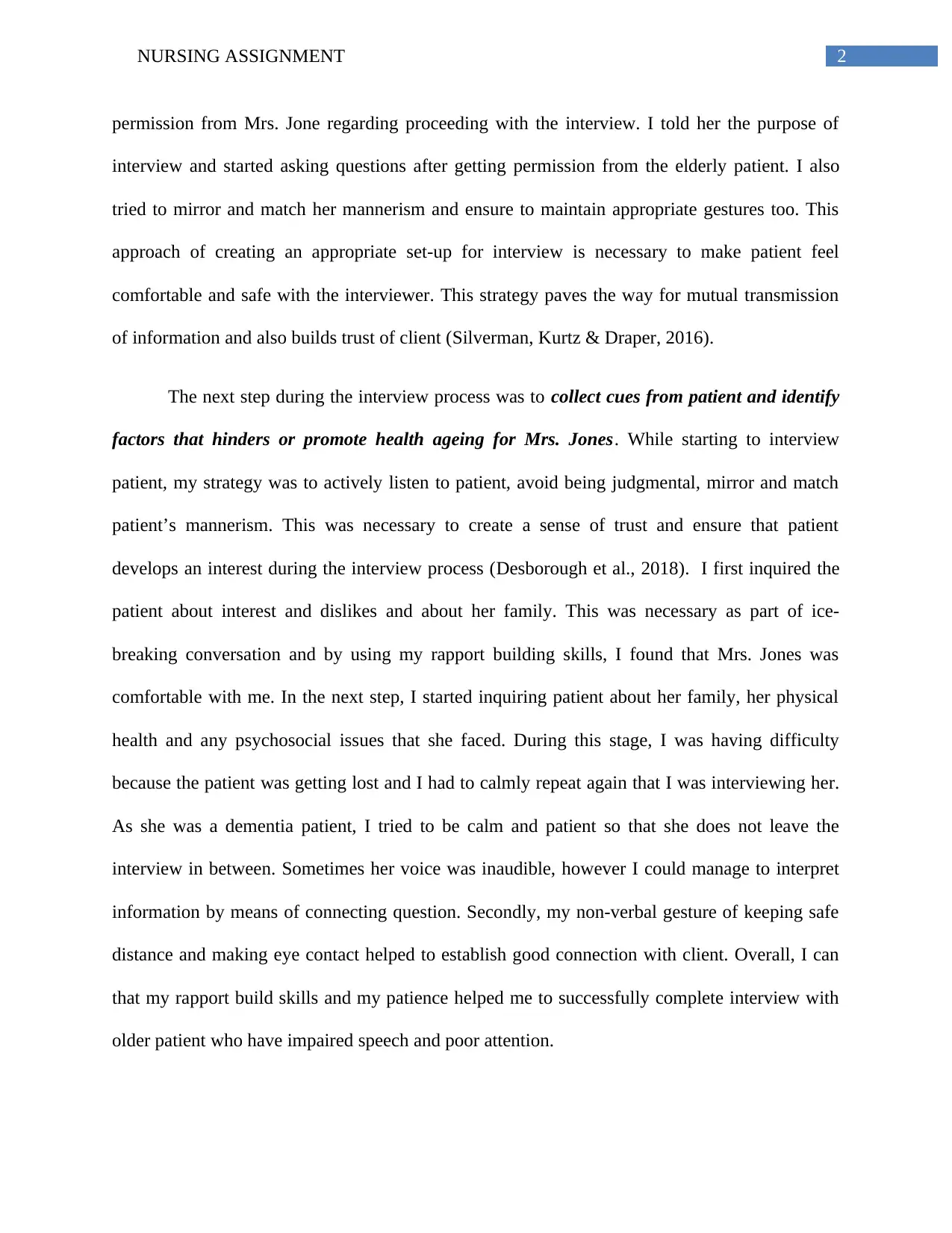
2NURSING ASSIGNMENT
permission from Mrs. Jone regarding proceeding with the interview. I told her the purpose of
interview and started asking questions after getting permission from the elderly patient. I also
tried to mirror and match her mannerism and ensure to maintain appropriate gestures too. This
approach of creating an appropriate set-up for interview is necessary to make patient feel
comfortable and safe with the interviewer. This strategy paves the way for mutual transmission
of information and also builds trust of client (Silverman, Kurtz & Draper, 2016).
The next step during the interview process was to collect cues from patient and identify
factors that hinders or promote health ageing for Mrs. Jones. While starting to interview
patient, my strategy was to actively listen to patient, avoid being judgmental, mirror and match
patient’s mannerism. This was necessary to create a sense of trust and ensure that patient
develops an interest during the interview process (Desborough et al., 2018). I first inquired the
patient about interest and dislikes and about her family. This was necessary as part of ice-
breaking conversation and by using my rapport building skills, I found that Mrs. Jones was
comfortable with me. In the next step, I started inquiring patient about her family, her physical
health and any psychosocial issues that she faced. During this stage, I was having difficulty
because the patient was getting lost and I had to calmly repeat again that I was interviewing her.
As she was a dementia patient, I tried to be calm and patient so that she does not leave the
interview in between. Sometimes her voice was inaudible, however I could manage to interpret
information by means of connecting question. Secondly, my non-verbal gesture of keeping safe
distance and making eye contact helped to establish good connection with client. Overall, I can
that my rapport build skills and my patience helped me to successfully complete interview with
older patient who have impaired speech and poor attention.
permission from Mrs. Jone regarding proceeding with the interview. I told her the purpose of
interview and started asking questions after getting permission from the elderly patient. I also
tried to mirror and match her mannerism and ensure to maintain appropriate gestures too. This
approach of creating an appropriate set-up for interview is necessary to make patient feel
comfortable and safe with the interviewer. This strategy paves the way for mutual transmission
of information and also builds trust of client (Silverman, Kurtz & Draper, 2016).
The next step during the interview process was to collect cues from patient and identify
factors that hinders or promote health ageing for Mrs. Jones. While starting to interview
patient, my strategy was to actively listen to patient, avoid being judgmental, mirror and match
patient’s mannerism. This was necessary to create a sense of trust and ensure that patient
develops an interest during the interview process (Desborough et al., 2018). I first inquired the
patient about interest and dislikes and about her family. This was necessary as part of ice-
breaking conversation and by using my rapport building skills, I found that Mrs. Jones was
comfortable with me. In the next step, I started inquiring patient about her family, her physical
health and any psychosocial issues that she faced. During this stage, I was having difficulty
because the patient was getting lost and I had to calmly repeat again that I was interviewing her.
As she was a dementia patient, I tried to be calm and patient so that she does not leave the
interview in between. Sometimes her voice was inaudible, however I could manage to interpret
information by means of connecting question. Secondly, my non-verbal gesture of keeping safe
distance and making eye contact helped to establish good connection with client. Overall, I can
that my rapport build skills and my patience helped me to successfully complete interview with
older patient who have impaired speech and poor attention.
⊘ This is a preview!⊘
Do you want full access?
Subscribe today to unlock all pages.

Trusted by 1+ million students worldwide
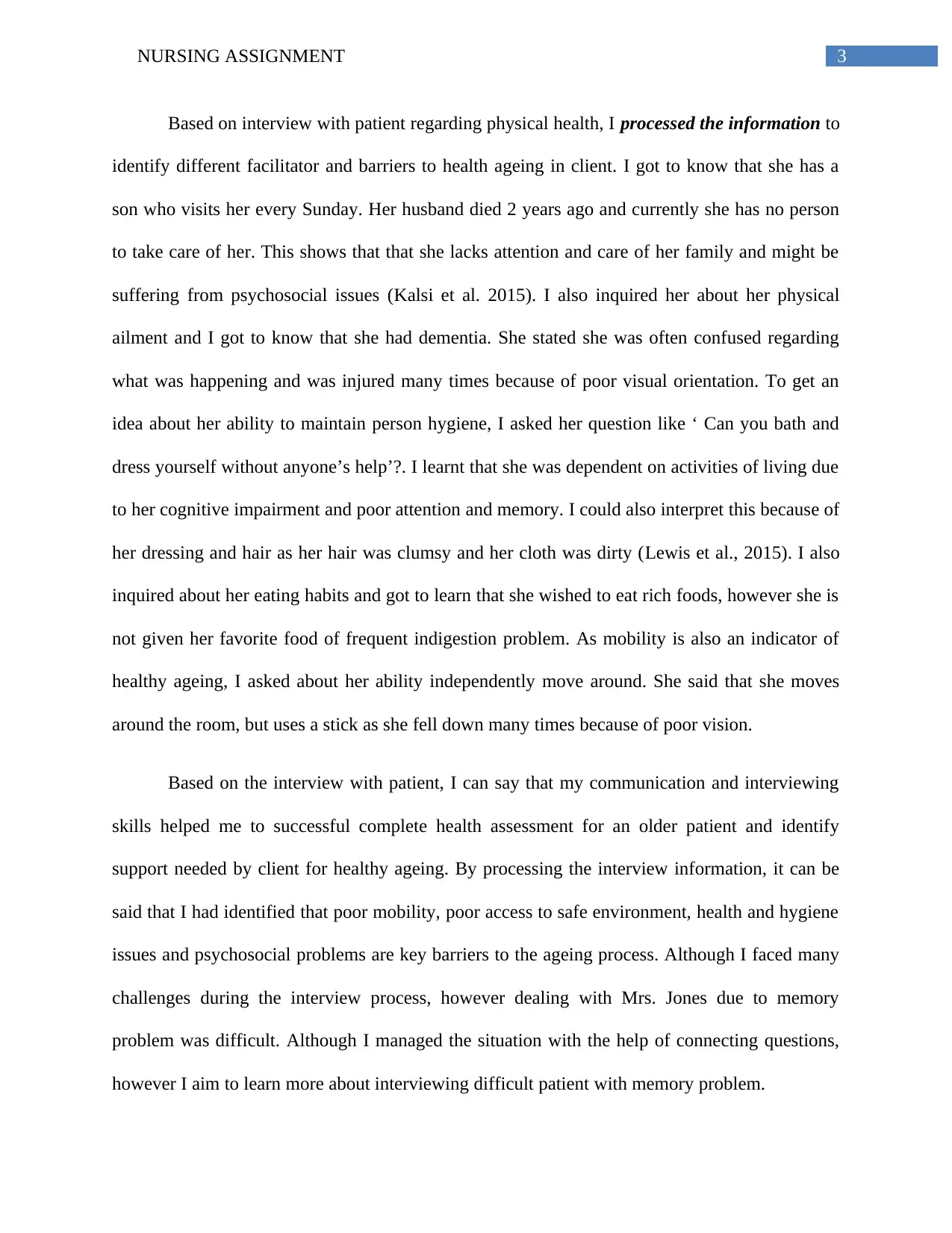
3NURSING ASSIGNMENT
Based on interview with patient regarding physical health, I processed the information to
identify different facilitator and barriers to health ageing in client. I got to know that she has a
son who visits her every Sunday. Her husband died 2 years ago and currently she has no person
to take care of her. This shows that that she lacks attention and care of her family and might be
suffering from psychosocial issues (Kalsi et al. 2015). I also inquired her about her physical
ailment and I got to know that she had dementia. She stated she was often confused regarding
what was happening and was injured many times because of poor visual orientation. To get an
idea about her ability to maintain person hygiene, I asked her question like ‘ Can you bath and
dress yourself without anyone’s help’?. I learnt that she was dependent on activities of living due
to her cognitive impairment and poor attention and memory. I could also interpret this because of
her dressing and hair as her hair was clumsy and her cloth was dirty (Lewis et al., 2015). I also
inquired about her eating habits and got to learn that she wished to eat rich foods, however she is
not given her favorite food of frequent indigestion problem. As mobility is also an indicator of
healthy ageing, I asked about her ability independently move around. She said that she moves
around the room, but uses a stick as she fell down many times because of poor vision.
Based on the interview with patient, I can say that my communication and interviewing
skills helped me to successful complete health assessment for an older patient and identify
support needed by client for healthy ageing. By processing the interview information, it can be
said that I had identified that poor mobility, poor access to safe environment, health and hygiene
issues and psychosocial problems are key barriers to the ageing process. Although I faced many
challenges during the interview process, however dealing with Mrs. Jones due to memory
problem was difficult. Although I managed the situation with the help of connecting questions,
however I aim to learn more about interviewing difficult patient with memory problem.
Based on interview with patient regarding physical health, I processed the information to
identify different facilitator and barriers to health ageing in client. I got to know that she has a
son who visits her every Sunday. Her husband died 2 years ago and currently she has no person
to take care of her. This shows that that she lacks attention and care of her family and might be
suffering from psychosocial issues (Kalsi et al. 2015). I also inquired her about her physical
ailment and I got to know that she had dementia. She stated she was often confused regarding
what was happening and was injured many times because of poor visual orientation. To get an
idea about her ability to maintain person hygiene, I asked her question like ‘ Can you bath and
dress yourself without anyone’s help’?. I learnt that she was dependent on activities of living due
to her cognitive impairment and poor attention and memory. I could also interpret this because of
her dressing and hair as her hair was clumsy and her cloth was dirty (Lewis et al., 2015). I also
inquired about her eating habits and got to learn that she wished to eat rich foods, however she is
not given her favorite food of frequent indigestion problem. As mobility is also an indicator of
healthy ageing, I asked about her ability independently move around. She said that she moves
around the room, but uses a stick as she fell down many times because of poor vision.
Based on the interview with patient, I can say that my communication and interviewing
skills helped me to successful complete health assessment for an older patient and identify
support needed by client for healthy ageing. By processing the interview information, it can be
said that I had identified that poor mobility, poor access to safe environment, health and hygiene
issues and psychosocial problems are key barriers to the ageing process. Although I faced many
challenges during the interview process, however dealing with Mrs. Jones due to memory
problem was difficult. Although I managed the situation with the help of connecting questions,
however I aim to learn more about interviewing difficult patient with memory problem.
Paraphrase This Document
Need a fresh take? Get an instant paraphrase of this document with our AI Paraphraser
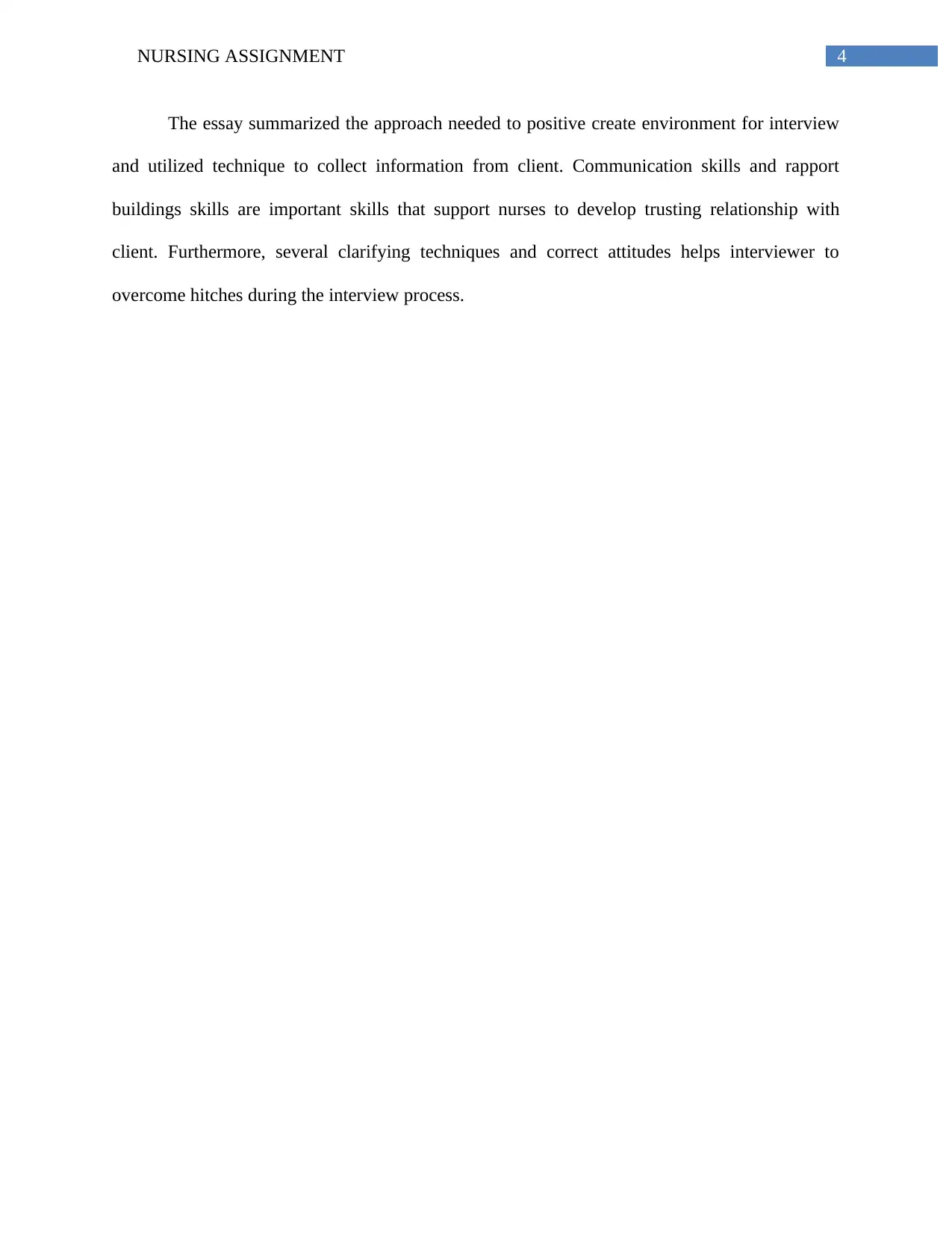
4NURSING ASSIGNMENT
The essay summarized the approach needed to positive create environment for interview
and utilized technique to collect information from client. Communication skills and rapport
buildings skills are important skills that support nurses to develop trusting relationship with
client. Furthermore, several clarifying techniques and correct attitudes helps interviewer to
overcome hitches during the interview process.
The essay summarized the approach needed to positive create environment for interview
and utilized technique to collect information from client. Communication skills and rapport
buildings skills are important skills that support nurses to develop trusting relationship with
client. Furthermore, several clarifying techniques and correct attitudes helps interviewer to
overcome hitches during the interview process.
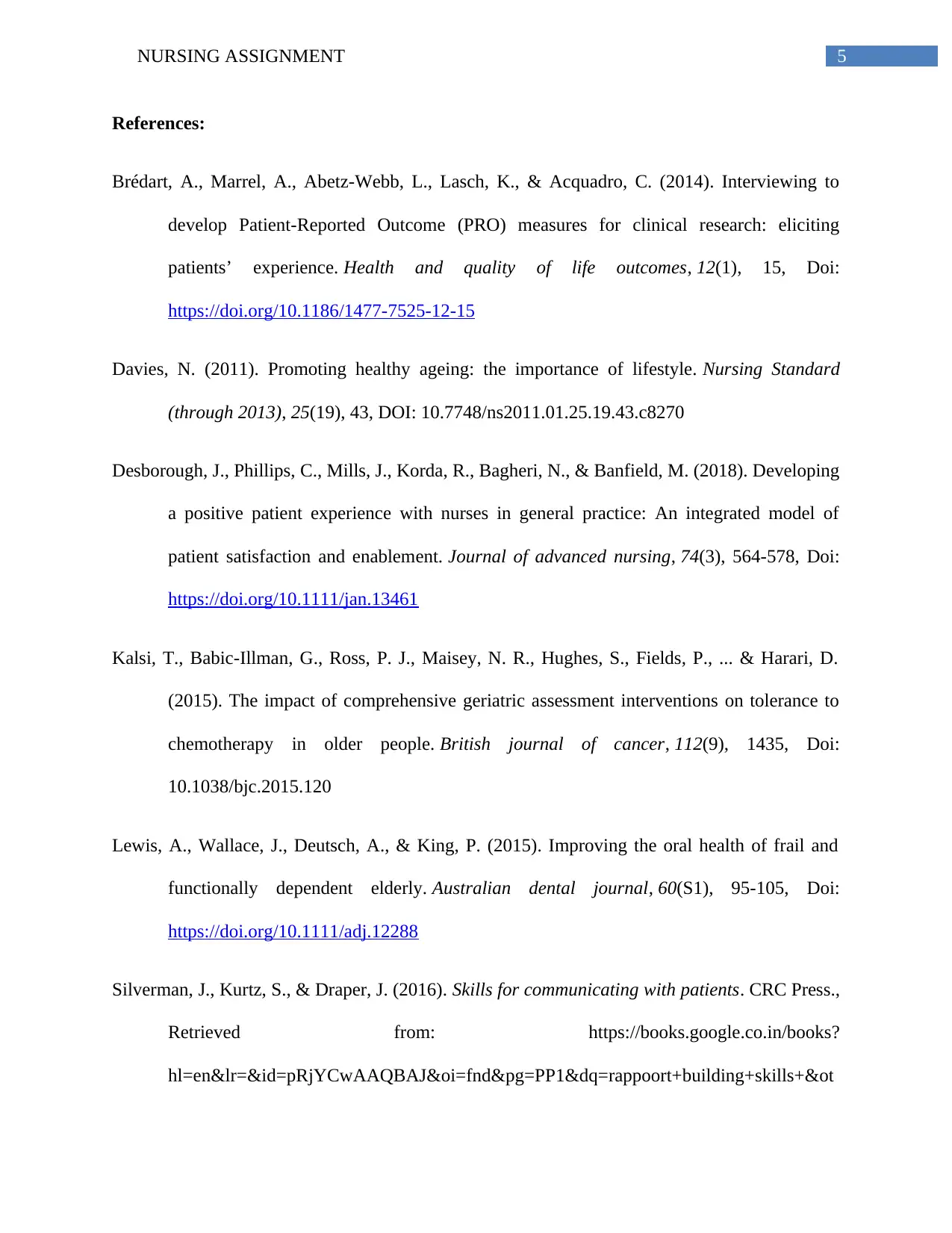
5NURSING ASSIGNMENT
References:
Brédart, A., Marrel, A., Abetz-Webb, L., Lasch, K., & Acquadro, C. (2014). Interviewing to
develop Patient-Reported Outcome (PRO) measures for clinical research: eliciting
patients’ experience. Health and quality of life outcomes, 12(1), 15, Doi:
https://doi.org/10.1186/1477-7525-12-15
Davies, N. (2011). Promoting healthy ageing: the importance of lifestyle. Nursing Standard
(through 2013), 25(19), 43, DOI: 10.7748/ns2011.01.25.19.43.c8270
Desborough, J., Phillips, C., Mills, J., Korda, R., Bagheri, N., & Banfield, M. (2018). Developing
a positive patient experience with nurses in general practice: An integrated model of
patient satisfaction and enablement. Journal of advanced nursing, 74(3), 564-578, Doi:
https://doi.org/10.1111/jan.13461
Kalsi, T., Babic-Illman, G., Ross, P. J., Maisey, N. R., Hughes, S., Fields, P., ... & Harari, D.
(2015). The impact of comprehensive geriatric assessment interventions on tolerance to
chemotherapy in older people. British journal of cancer, 112(9), 1435, Doi:
10.1038/bjc.2015.120
Lewis, A., Wallace, J., Deutsch, A., & King, P. (2015). Improving the oral health of frail and
functionally dependent elderly. Australian dental journal, 60(S1), 95-105, Doi:
https://doi.org/10.1111/adj.12288
Silverman, J., Kurtz, S., & Draper, J. (2016). Skills for communicating with patients. CRC Press.,
Retrieved from: https://books.google.co.in/books?
hl=en&lr=&id=pRjYCwAAQBAJ&oi=fnd&pg=PP1&dq=rappoort+building+skills+&ot
References:
Brédart, A., Marrel, A., Abetz-Webb, L., Lasch, K., & Acquadro, C. (2014). Interviewing to
develop Patient-Reported Outcome (PRO) measures for clinical research: eliciting
patients’ experience. Health and quality of life outcomes, 12(1), 15, Doi:
https://doi.org/10.1186/1477-7525-12-15
Davies, N. (2011). Promoting healthy ageing: the importance of lifestyle. Nursing Standard
(through 2013), 25(19), 43, DOI: 10.7748/ns2011.01.25.19.43.c8270
Desborough, J., Phillips, C., Mills, J., Korda, R., Bagheri, N., & Banfield, M. (2018). Developing
a positive patient experience with nurses in general practice: An integrated model of
patient satisfaction and enablement. Journal of advanced nursing, 74(3), 564-578, Doi:
https://doi.org/10.1111/jan.13461
Kalsi, T., Babic-Illman, G., Ross, P. J., Maisey, N. R., Hughes, S., Fields, P., ... & Harari, D.
(2015). The impact of comprehensive geriatric assessment interventions on tolerance to
chemotherapy in older people. British journal of cancer, 112(9), 1435, Doi:
10.1038/bjc.2015.120
Lewis, A., Wallace, J., Deutsch, A., & King, P. (2015). Improving the oral health of frail and
functionally dependent elderly. Australian dental journal, 60(S1), 95-105, Doi:
https://doi.org/10.1111/adj.12288
Silverman, J., Kurtz, S., & Draper, J. (2016). Skills for communicating with patients. CRC Press.,
Retrieved from: https://books.google.co.in/books?
hl=en&lr=&id=pRjYCwAAQBAJ&oi=fnd&pg=PP1&dq=rappoort+building+skills+&ot
⊘ This is a preview!⊘
Do you want full access?
Subscribe today to unlock all pages.

Trusted by 1+ million students worldwide
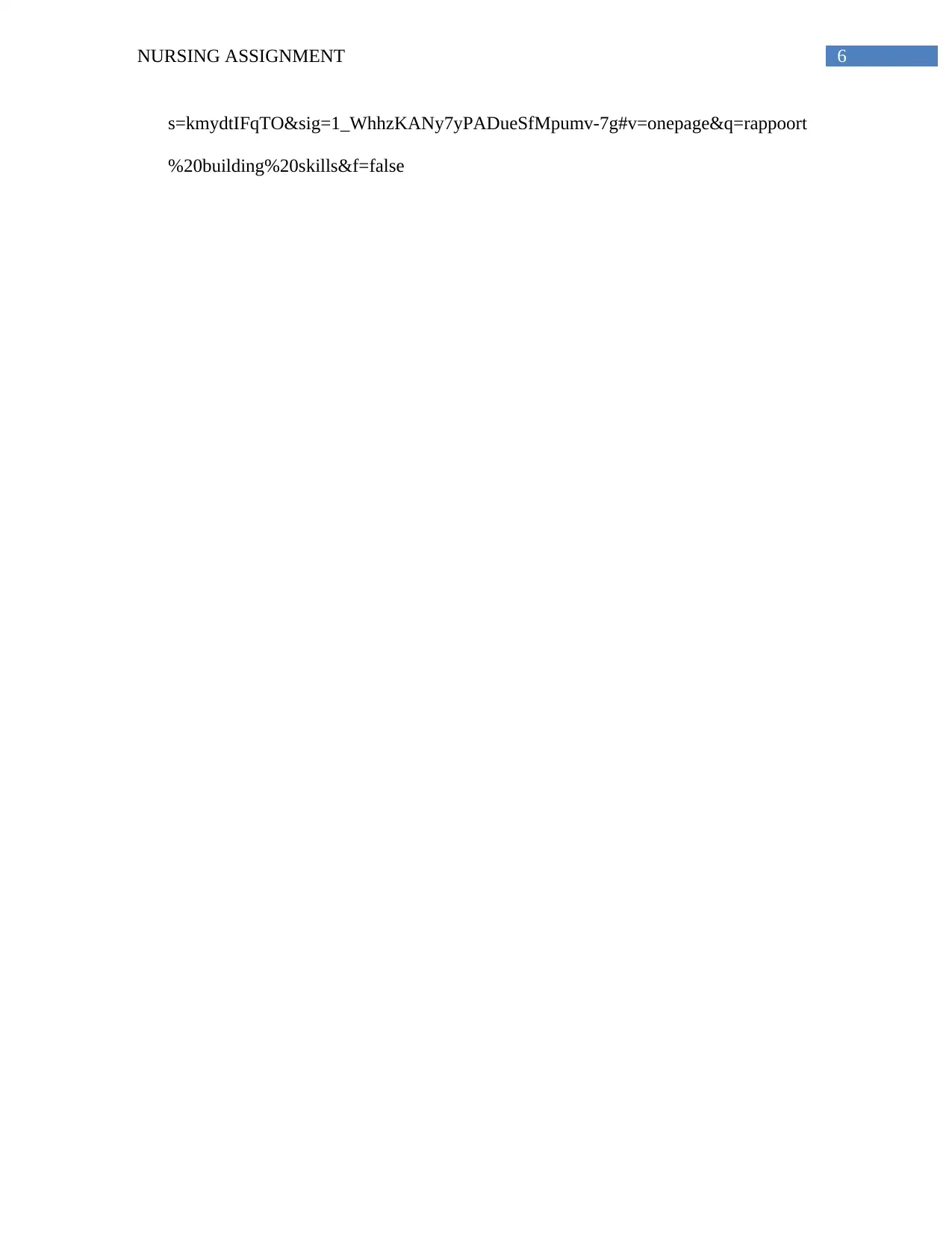
6NURSING ASSIGNMENT
s=kmydtIFqTO&sig=1_WhhzKANy7yPADueSfMpumv-7g#v=onepage&q=rappoort
%20building%20skills&f=false
s=kmydtIFqTO&sig=1_WhhzKANy7yPADueSfMpumv-7g#v=onepage&q=rappoort
%20building%20skills&f=false
1 out of 7
Related Documents
Your All-in-One AI-Powered Toolkit for Academic Success.
+13062052269
info@desklib.com
Available 24*7 on WhatsApp / Email
![[object Object]](/_next/static/media/star-bottom.7253800d.svg)
Unlock your academic potential
Copyright © 2020–2026 A2Z Services. All Rights Reserved. Developed and managed by ZUCOL.





